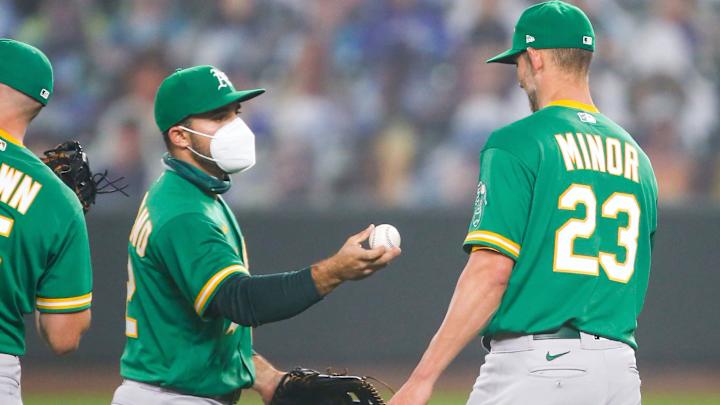Seattle Air Quality Prompts Concern for MLB Players' Safety

The conditions of this baseball season have limited the capacity for surprise.
A scenario that would have once seemed unthinkable—short season, empty ballparks, dozens of pages of health regulations—quickly became thinkable and soon after became real. The rule changes that had previously inspired fierce debate were accepted with little fuss. (Remember arguing over the universal DH?) The result is baseball that is far from “normal.” But it’s proved surprisingly—perhaps even disturbingly—easy to watch. After six weeks of play, baseball discourse is no longer stuck on how any of this should work, and instead is largely, well, baseball.
Part of that is a basic desire to acclimate to new situations. (It is, after all, not just this year in baseball that has limited the capacity for surprise. It’s this year in being alive.) But much of this specific accommodation comes from the fact that it is all designed to be compartmentalized fairly easily. You can zoom in on the field and ignore the empty stands. You can analyze the new rules as academic exercises rather than pandemic-prompted requirements. You can evaluate roster moves as roster moves and not as crisis management for teams temporarily hollowed out by viral outbreak. It is all kept at just enough of a remove to offer plausible deniability. If you really do not wish to be reminded of the context here—of not just what is different but why it is different—you can work around it all fairly straightforwardly.
Which is what was so remarkable about Monday’s doubleheader between the A’s and Mariners in Seattle.
For the first time this season, there was a sign of disruption that was constant and tangible and could not be ignored, no matter how hard one might try. Due to the smoke from the West Coast wildfires, Oakland and Seattle played in a haze, thick enough to be seen on television. Some players wore N-95 masks. The situation prompted questions about whether it was safe to play at all, a bleak variation on the same basic conversation that baseball has had to face all season.
After a week of eerily discolored skies over ballfields in California, photographs grimly captioned with sci-fi references, this was a new level. It was the first game where the circumstances made themselves known, obvious to viewers at home, quite literally in the air for every pitch.
what the centerfield camera shot normally looks like versus what it looks like today pic.twitter.com/WFNI7pE0O5
— Joon Lee (@joonlee) September 14, 2020
“I’m a healthy 22-year-old,” Oakland pitcher Jesús Luzardo told reporters afterward. “I shouldn’t be gasping for air or missing oxygen. I’ll leave it at that.”
MLB does not have a standard threshold for the Air Quality Index below which teams cannot play. Clubs are instead supposed to consult with local health departments; King County told residents to “stay indoors as much as possible” on Monday while the National Weather Service’s Seattle office warned that most parts of the region were “very unhealthy or hazardous.” The AQI at the ballpark around first pitch of the first game was 218—”very unhealthy,” or the fifth-worst of the six levels, as described by the EPA.
MLB does not have a set Air Quality Index threshold where teams aren't allowed to play. They ask teams consult with local health departments.
— Ryan Divish (@RyanDivish) September 14, 2020
Over 200 is considered very unhealthy pic.twitter.com/m1Xyq9ebSN
It’s not clear whether serious consideration was ever given to not playing. Oakland manager Bob Melvin said that the topic had not been broached with him or the A’s, but he’d been under the impression that there were supposed to be restrictions for an AQI above 200, even though the air quality had been worse than that for most of the day. (It climbed as high as 283.) “It was pretty smoky out there,” Melvin said. “Guys were starting to feel it in the second game some.”
There was not supposed to be a second game. Originally, this was meant to be a travel day, not a doubleheader—it was rescheduled after an earlier series was postponed due to an A’s positive test for COVID-19.
Now, of course, that’s probably not a surprise.
Quick Hits
• The Mets might finally be free: Fred and Jeff Wilpon announced on Monday that they had signed an agreement to sell the team to hedge fund manager Steve Cohen. The move is still pending approval by other club owners, but if it goes through, it will mark the end of a (largely frustrating and chaotic) era for the Mets.
• The Padres beat the Dodgers, 7–2, to move within just a game and a half of first place in the NL West.
• The Orioles beat the Braves 14–1 and had this sweet deflection play.
Rio said I’ll take it from here pic.twitter.com/XaKMvKQLiC
— Baltimore Orioles (@Orioles) September 15, 2020

Emma Baccellieri is a staff writer who focuses on baseball and women's sports for Sports Illustrated. She previously wrote for Baseball Prospectus and Deadspin, and has appeared on BBC News, PBS NewsHour and MLB Network. Baccellieri has been honored with multiple awards from the Society of American Baseball Research, including the SABR Analytics Conference Research Award in historical analysis (2022), McFarland-SABR Baseball Research Award (2020) and SABR Analytics Conference Research Award in contemporary commentary (2018). A graduate from Duke University, she’s also a member of the Baseball Writers Association of America.
Follow emmabaccellieri